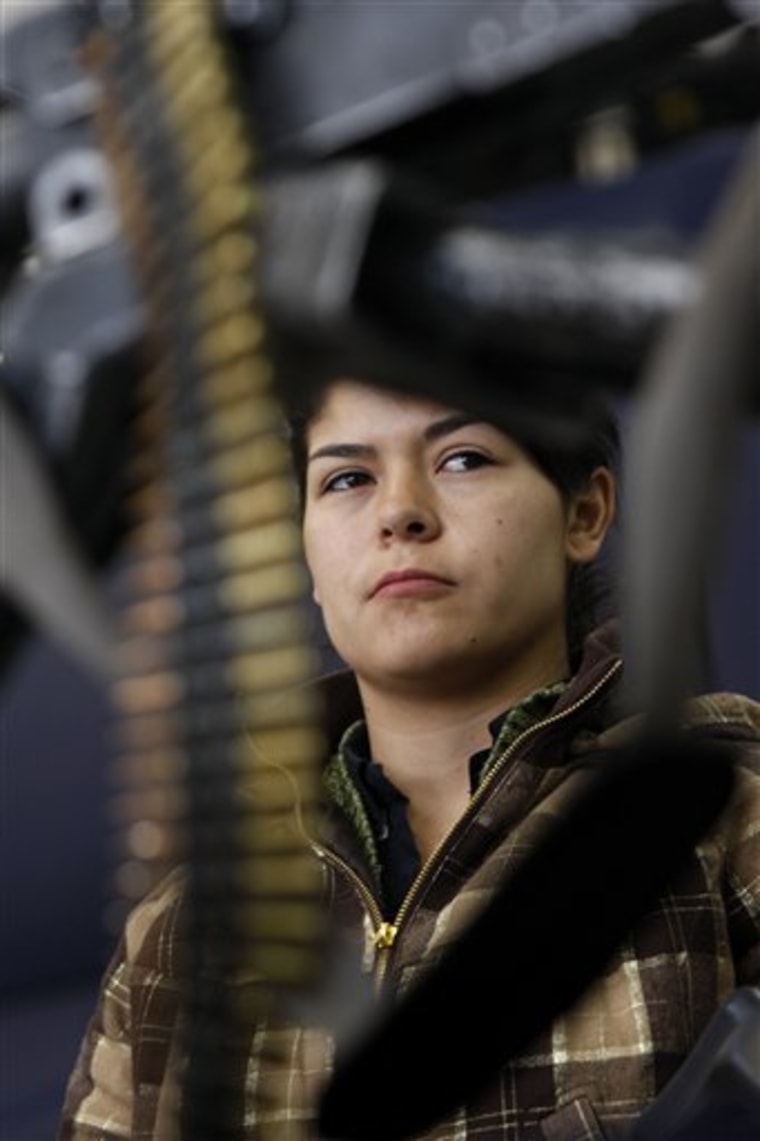Mexican authorities arrested a woman guarding an arsenal that included the first anti-aircraft machine gun seized in Mexico, police said Tuesday, as the army announced the capture of an alleged top drug cartel lieutenant.
The arsenal belonged to a group linked to the powerful Beltran-Leyva drug cartel, federal police coordinator Gen. Rodolfo Cruz said. It also included ammunition, five rifles, a grenade and part of a grenade launcher.
Mexican drug cartels, battling a fierce crackdown by soldiers and federal police, have increasingly gotten hold of higher-powered weapons, even military-grade arms such as grenades and machine guns. That has left police — particularly state and municipal forces — grossly outgunned, and many officers have quit following attacks.
Gun found atop SUV
Cruz said the confiscated .50-caliber, anti-aircraft machine gun can fire 800 rounds per minute and is capable of penetrating armor from more than 5,000 feet away. Police on a routine patrol Monday found the gun fitted atop an SUV at a house in northern Sonora state.
Authorities did not release any other details about the gun, including its make, where it was manufactured, or where it was sold.
The arrested suspect, Anahi Beltran Cabrera, apparently is not related to the Beltran-Leyva clan, Cruz said.
The U.S. Bureau of Alcohol, Tobacco, Firearms and Explosives has traced many guns seized at scenes of drug violence in Mexico to U.S. commercial sources. But determining the source of military-grade weapons such as grenades and fully automatic machine guns is more complicated.
The ATF says the grenades are mostly smuggled in through Central America, and have been traced back to the militaries of many countries, from South Korea to Spain and Israel. Some may be leftovers from the Central American civil wars.
Assailants have fired on government aircraft performing anti-drug missions in Mexico in the past, but apparently never with the caliber of weapon found Monday.
In 2006, a helicopter on a federal drug-eradication mission crashed while trying to escape ground fire, and a second helicopter was damaged by gunfire in the Pacific coast state of Guerrero.
Problem of gun smuggling
Mexico is upgrading its northern and southern border checkpoints in an effort to detect and seize more guns and other contraband, installing equipment that will weigh and photograph each car and truck coming into the country.
President Barack Obama has promised to do more to stop gun trafficking from the United States to Mexico. He has pledged to dispatch nearly 500 more federal agents to the border, along with X-ray machines and drug-sniffing dogs.
Also Tuesday, the Mexican army announced the capture of Ruben Granados Vargas, an alleged lieutenant for the Beltran-Leyva drug cartel in the Pacific coast state of Guerrero.
Gen. Luis Arturo Oliver said soldiers caught Granados Vargas and two other suspects with four rifles and 2.6 pounds (1.2 kilograms) of opium on Monday.
Granados Vargas allegedly ran the cartel's drug planting, harvesting and trafficking operations on the coast west of the resort of Acapulco.
Turf war with alleged cartel
He is implicated in a number of kidnappings and killings in the region, including attacks as part of a turf war with an alleged Sinaloa cartel rival that left 17 people dead last year, organized crime prosecutor Marisela Morales said.
Granados Vargas' wife, sister-in-law and two sons were later killed in retaliation, prosecutors.
Mexico's drug violence has claimed more than 10,650 lives since President Felipe Calderon launched a military-led offensive against trafficking cartels in December 2006.
In March, the government sent thousands more troops to the northern border to quell escalating violence. The government announced Sunday that drug-related homicides fell 26 percent across the country in the first three months of the year, compared to the same period in 2008.
